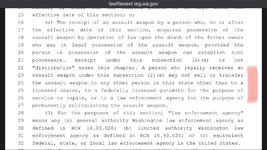Silver Lifetime
Bronze Lifetime
- Messages
- 1,953
- Reactions
- 4,911
Do you have a citation that shows this limitation of inheritance in the law? I would be interested to see how that modifies the above cited passage.This is how I read the law.
Its the first attempt Ive seen at legislating away the grandfather clause. The left knows they need a grandfather clause to pass any AW bans but they also know there are enough "assault" weapons in any state to continue a healthy market of buying and selling used. Rest assured other states will follow as they collaborate.
Washington will not be legal to own any AW in as little as 2 generations from now.













